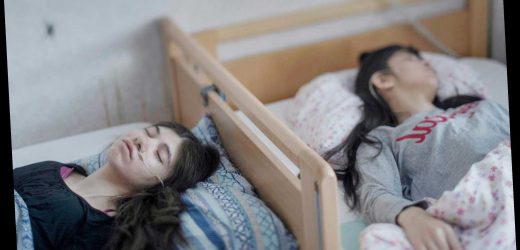CHILDREN from refugee families in Sweden are mysteriously falling into coma-like states and not waking up for years.
The condition, called 'resignation syndrome', has baffled doctors as tests on the kids' brain show they are responsive to waking and sleeping despite being seemingly unconscious.
According to reports, the mystery illness was first seen in Sweden in the 1990s – but grew rapidly by the mid-2000s.
Between 2003 and 2005, 424 cases were reported and hundreds more children have since been struck down with the syndrome.
What is bizarre about the condition is that it only affects kids from refugee families in one country in the world.
Neurologist Suzanne O’Sullivan travelled to Stockholm to study two sisters suffering from the condition.
Describing the onset of symptoms in The Times, she wrote: "Children initially became anxious and depressed.
"Their behaviour changed: they stopped playing with other children and, over time, stopped playing altogether.
"They slowly withdrew into themselves, and soon they couldn’t go to school. They spoke less and less, until they didn’t speak at all.
"Eventually they took to bed. If they entered the deepest stage, they could no longer eat or open their eyes. They became completely immobile…
"They ceased having any active participation in the world."
The patients – whose ages range from seven to 19 – are fed through tubes and their families keep their joints mobile through physiotherapy.
According to Dr O’Sullivan, the kids "were traumatised long before they fell ill."
Most of them began to withdraw during the process of applying for asylum application – faced with the prospect of a return to the war-torn countries they had fled.
The Times report, citing Swedish psychologist, says the children "usually woke up" after their families were granted residency, although not overnight.
What is resignation syndrome?
Doctors studying the rare condition note that it tends to only affect refugees from eastern Europe, fleeing "holistic" societies where the family unit, and wider society, is always championed over the needs of the individual.
A report by the Swedish government suggested that the stricken children may be acting in line with their society's unspoken rules, subconsciously giving up the will to live without any direct encouragement in the hope that it will save their family.
Because of this, with no obvious medical cure, many psychologists believe that only the security of permanent residency can bring the children back.
Children making the journey to a new life have developed resignation syndrome when their families are denied applications to remain.
The condition is still not fully understood – and some doctors are pushing back against the belief that apathetic children should be left in their comas until the family is granted residency.
Karl Sallin, a paediatrician at Karolinska University Hospital, told the New Yorker: "Another way to give the children hope would be to treat them properly and not leave them lying on a bed with a nasal tube for nine months."
In response to national outrage at the plight of these children, Sweden changed the rules to make sure no apathetic children are deported – securing the status of hundreds of refugee families in the process.
According to the report, families seeking asylum in Sweden are interrogated rather than listened to and children are often obliged to sit through the hearings.
And despite accusations that the patients are faking the illness, doctors familiar with the condition insist children as young as seven cannot sustain such a prolonged state of unresponsiveness.
One girl who woke after years in the coma-like state described it as "like being in a dream that she didn’t want to wake up from.”
However, another child, a boy, gave a much more disturbing description.
O’Sullivan wrote: "He had felt as if he were in a glass box with fragile walls, deep in the ocean.
"If he spoke or moved, he thought, it would create a vibration, which would cause the glass to shatter.
"‘The water would pour in and kill me,’ he said.”
Theories explaining the illness remain "incomplete", the report says.
Medics have noted a fast heart rate and high body temperature in some patients which could be a stress response.
Another smaller study noted a lack of the stress hormone cortisol – which again adds to the stress hypothesis.
The condition has also been compared to PRS, also called pervasive arousal withdrawal syndrome, a disorder in which youngsters shut down and refuse to eat, talk, or walk.
This has also been linked to stress and trauma.
O’Sullivan believes the condition could be linked to the children's past experiences in their homelands.
She writes: "It seems likely, then, that this past trauma would play a significant role in the illness.
"Perhaps it is a form of post-traumatic stress disorder?
"Or could the ordeals suffered by the parents have affected their ability to parent, which in turn impacted on the emotional development of the child?
"One psychodynamically minded theory is that the traumatised mothers are projecting their fatalistic anguish onto their children, in what one doctor described as an act of 'lethal mothering.'"
Source: Read Full Article


